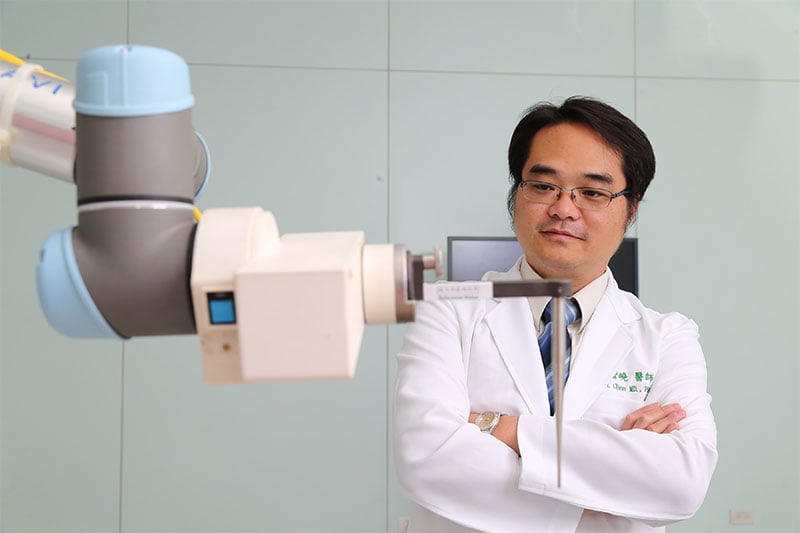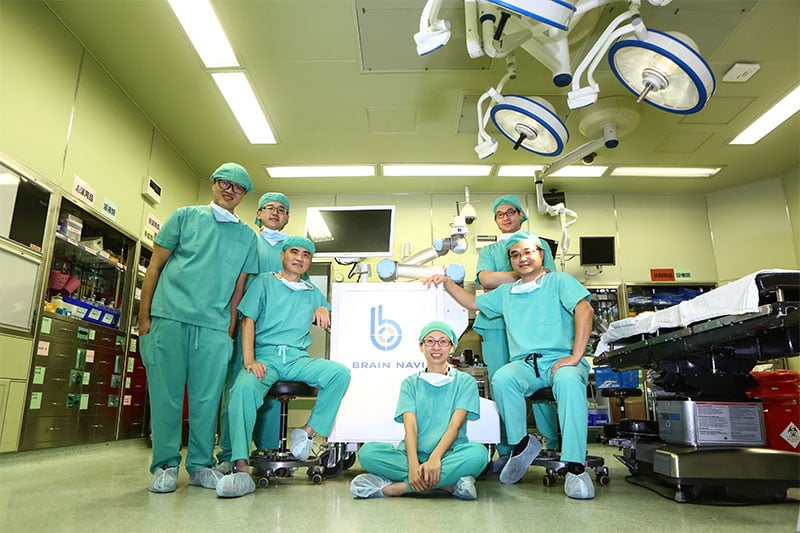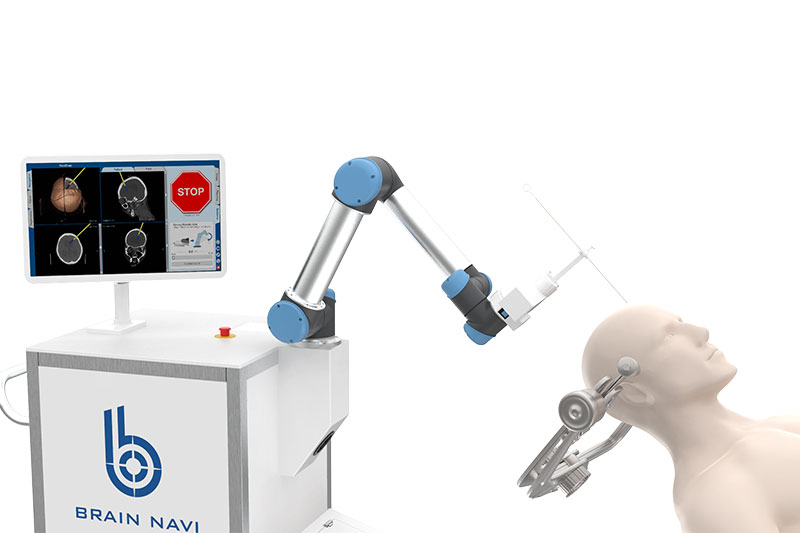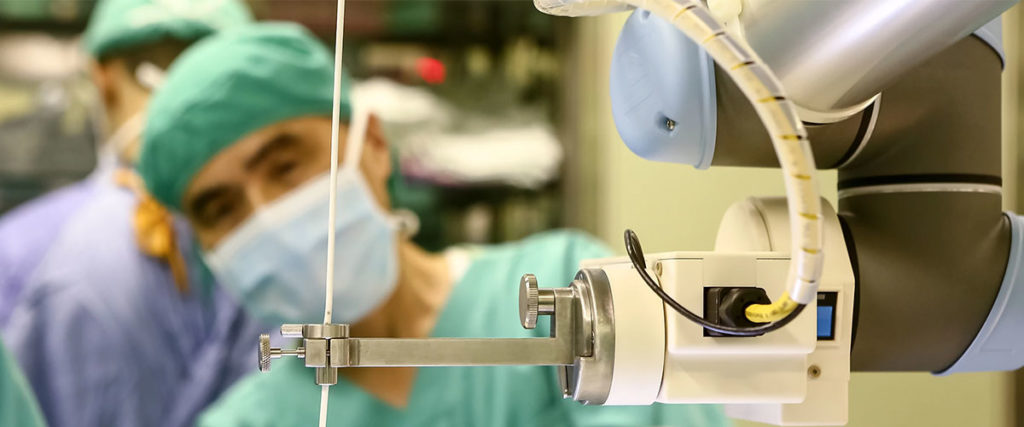Could doctors be replaced with artificial intelligence? CEO of NaoTrac Jerry Chan chats with Hive Life about AI and the future of biomedical technology.
What if a robot could perform brain surgery? Taiwanese-based biomedical company Brain Navi ventures to answer this question with NaoTrac, an artificial intelligence navigation system built to perform precise neurosurgeries. The latest brainchild of surgeon-turned-entrepreneur Dr Jerry Chen, Brain Navi aims to help surgeons improve accuracy, streamline surgical procedures and reduce their sky-high learning curve with their innovative surgical navigation and robotic techniques. He explained a world in which we’re grateful for the robots performing surgery on our heads.

Equipped with a formidable background in medicine and biomedical engineering, Jerry has dedicated his life to finding solutions to modern problems. “I like to invent something to improve medical processes,” he says. “I am the kind of person that is not satisfied by current solutions.” After receiving his degree in medicine in his home city Taiwan, he joined the Stanford-Taiwan Biomedical programme in 2012, a programme dedicated to sending medical or engineering doctors to Stanford University to learn about how to start up a medical device company. While there, he founded his first company iXensor Co. Ltd., creating a technology that allowed users to use mobile devices as medical devices. Fueled by his enthusiasm for developing new solutions to improve clinical processes, he went on to found Brain Navi upon his return to Taiwan while pursuing his PhD in biomedical engineering alongside it.
You might also like AI Healthcare: More Accurate Than Doctors?

As a surgeon himself, Jerry is aware of the difficulties that come with performing surgery. “Traditionally, a surgeon has to spend about five to seven years maturing,” he explains. “That means a lot of patients are being used to train doctors.” With the help of NaoTrac, an autopilot brain surgical robot which combines the use of machine vision, artificial intelligence and robotic techniques, Brain Navi wants to help surgeons achieve better results by enhancing neurosurgical precision. Jerry likens it to the navigation systems in autopilot cars: “When you are driving, you have to have several systems. First, you have to have a map. Then, you have to have a satellite to know where your car is, and in your car, you have to have some sensors. Then you can plan your driving path with Google Maps.” In autopilot surgeries, the CT or MRI scan serves as the ‘map’ with which doctors can plan their surgical pathways. Using computer vision systems and sensors as ‘satellites,’ NaoTrac is able to track anatomical locations and handle instruments in a precise and accurate way.

It isn’t always smooth sailing for the brilliant minds at Brain Navi, Jerry says, admitting that the team often faces difficulties. “We are doing something that other companies have never done,” he explains. “We have to think about how to do new things, try new techniques. About 90% of the time, we are solving problems.” In particular, during their first clinical trial, the team was tasked with alleviating patients’ worries by reassuring them of NaoTrac’s precision and safety. “Especially during the first case, the patient was a little nervous,” he remembers. “We explained the process and presented the results of our animal studies, which involved a very precise procedure.” To do this, they require support – something, luckily, they have found. “I think we are lucky,” Jerry says. “In Taiwan, many medical device startups do not easily get funding. Especially last year and this year, it’s been a difficult time, but we are lucky. We have strong financial backing, and we have very strong government support.”

Jerry emphasises that NaoTrac is not a substitute for real-life surgeons. “We can help doctors by making surgery easier, more precise and most straightforward, so they can rely on our devices and be more relaxed and confident, but we cannot replace them.” He urges that NaoTrac should be seen as an assistant, helping to streamline medical procedures and reduce doctors’ workloads. Drawing an example from current events, he explains, “Right now, we have the coronavirus. If the doctors have to see more than a thousand chest CT scans a day, it could be a disaster.” By making use of artificial intelligence to pick out abnormal CTs, doctors can make diagnoses more quickly. In the future, he believes that AI will go on to play an even bigger role in the operating room. “I think many more procedures will be helped by robots,” Jerry predicts. “Doctors will be able to perform the surgery more easily and efficiently. The patient outcome will be better and operation times will shorten.”
As of now, the first version of NaoTrac has been finalised and is awaiting its CE marking, which is expected within the year. Work has begun on the second generation of the product, which will include a revamped design and features to improve the surgical processes, and is scheduled to be released later in the year. In the future, Jerry plans to expand NaoTrac to perform other forms of surgery with the goal of taking his device overseas. “We’re looking to global markets,” Jerry says. “We have very strong technology. We have the devices. We are looking for connections and investors all around the world so we can expand outside of Taiwan.”
For more information on Brain Navi, please visit their website or their LinkedIn.
Related Articles
An App to Help Doctors Save Lives





